- Home
- Kristin Harmel
Italian for Beginners Page 25
Italian for Beginners Read online
Page 25
“Wait, you said what?”
“That I am your agent,” Karina said with a smile. “And by the way, I will be taking my ten percent.”
I stared at her. “And you sent pictures to the gallery already?”
“Yes. Three of them.”
“How?”
“I have a key to your apartment, remember? And they are all on your computer.”
“You broke into my apartment to steal pictures?”
“No,” Karina clarified a little sheepishly. “I opened the door to your apartment to share your pictures.”
“And you sent three random pictures to some stranger in New York?” I pressed on.
“No, I spent an hour and a half deciding which three pictures captured the heart of Roma the very best,” she said. “And I sent them to a gallery owner I’d spent an hour telling how wonderful and talented you were.”
I couldn’t believe what she was telling me. “What did the gallery owner say?”
She smiled. “She said that they were three of the most beautiful pictures of Roma she had ever seen. She said they truly captured the heart of the city she loved. She said they made her feel inspired.”
My jaw dropped.
Karina smiled and continued. “She said she’d like to start off with a collection of ten of your photographs. She’ll blow them up and frame them, and they’ll hang in her gallery for thirty days. If they sell, you will get paid seventy-five percent; she takes twenty-five percent as her gallery fee. She said it gets renegotiated down to twenty percent once a photographer has exhibited there successfully for six months.”
“What did you tell her?”
“That I would talk to the photographer and get back to her.” She paused. “She asked for your name, but I didn’t tell her. I didn’t know if you wanted to use your real name or not.”
I thought about it for a moment. I couldn’t believe this was happening. I knew I should have been upset with Karina for sending out my photographs without my permission. But I was blown away by her enthusiasm, her wide-eyed belief that of course someone would want to buy my pictures. And the crazy thing was, someone did. A stranger in New York, someone who had come from Rome, saw my pictures and felt inspired.
Still, I wasn’t entirely sure that I wanted to put my own stamp on the photos yet. Although I knew that at nearly thirty-five, I should be more secure, I was still terrified of failing. But what else could I call myself?
I thought for a moment about what had brought me to this place, what had initially made me decide to hide behind the lens of a camera, what had made me seek out answers in this city that would never quite be mine.
I suddenly felt like a giant weight had been lifted from my shoulders. I smiled.
“Tell her,” I said slowly, “that the photo credit should read ‘Audrey H. Verdicchio.’ ”
Chapter Twenty
Marco called the next day. I met him for coffee at Pinocchio, and I filled him in on my big few days, leaving out any mention of Michael for now. I still hadn’t decided how I felt about him. Or about Marco. But I didn’t think one situation should necessarily influence the other. Not yet.
“I am so happy for you,” Marco said after I had finished. “And so proud of you, too, for going to see your aunt.”
I nodded. “I felt like it was the right thing to do.”
Marco studied my face for a moment. Then he reached across the table to gently brush the hair out of my face. “You’ve only been here for a few weeks,” he said. “And it’s like you’ve become a different person.”
I thought about it for a moment. “No,” I said. “I think it’s that I’ve finally become me.”
Marco nodded slowly. “There is nothing better for each of us to be than ourselves, is there?”
I shook my head, thinking of all the time I’d wasted trying to be someone more lovable, more reliable, more organized, and less easy to leave. And the one big thing that had been missing had been staring me in the face all along. All I had to be was me. Imperfect, hasn’t-got-it-all-figured-out-yet me. Cat Connelly, the daughter of Bruce and Audrey, two people who didn’t quite have it all figured out, either. Two people who loved their daughters, even if they didn’t always know how to show it. Maybe being loved didn’t always have to be something I earned, something I fought for. Maybe it could just be, when the time was right.
“So, the photo gallery has asked to see a wider variety of Rome photographs before they choose my initial ten,” I concluded. “Karina sent them a selection of the photos I’ve taken so far. But the gallery owner wants more.” I paused and felt myself blushing a little. “Karina says that this woman thinks there’s going to be a high demand for these photos once she begins exhibiting them.”
“When will that happen?” Marco asked.
“In about three weeks,” I said. “She’s about to take down a display from a photographer in Tuscany, a series of sunflower shots that just aren’t selling very well. She wants to put my exhibit in its place. Apparently, historic urban art is hot now.”
“This is wonderful, Cat.” Marco beamed at me. He leaned forward to kiss me on the cheek. “You must be so happy.”
“I am.” I smiled back. “So. I have eight more days here. And I need to find some shots that capture the soul of Rome. I want to bowl this gallery owner over, Marco. I want to go in with images like nothing she’s ever seen.”
I felt excited for the first time in a very long time. A nervous, apprehensive, fluttery kind of excited, where I felt like everything could cave in on me suddenly… or the whole world was about to open up. I just didn’t know which way it would go yet.
“Let me help,” Marco said.
“What?”
He grinned. “Let me help you. This is my city. I fell in love with it the moment I first came here from Venice, and I’ve spent so many hours wandering the streets and taking it all in. I can take you to my favorite places in the city. And I can help you find your own.”
I hesitated. “Are you sure you want to do that?” I asked. “You have to work.”
He shrugged. “Of course I do,” he said. “But I do not have to be here all the time. And I want to help you. I want to see my city through your eyes. And I want you to see my city through mine.”
I smiled. “You’re pretty great, you know that?” I paused and tried to remember a line from Roman Holiday. “You’ve helped give me faith in relations between people,” I paraphrased a line from the movie’s final scene.
Marco got it immediately. He grinned and put on his best Joe Bradley accent. “ ‘May I say, speaking from my own press service, we believe that your highness’s faith will not be unjustified.’ ”
I laughed. “See, it’s more fun when we can both play.”
Marco reached across the table and squeezed my hand. Then he leaned across to kiss me, gently and tenderly, on the lips.
For the next week, Marco met me each morning and took me to a different spot in Rome—the Arco di Constantino, a beautiful arch covered in ancient battle scenes, one day, and the Terme di Caracalla, the towering ruins of public baths used until the sixth century, another day. I’d discovered that Rome was at its most beautiful in the morning, before the sun rose too high in the sky, and I enjoyed shooting the ancient monuments, the beautiful domes, and the Roman people going about their daily routines when the pale light softened the edges of everything, giving the city a magic, ethereal glow.
Marco helped me carry my heavy camera bag, laughed at my jokes, told me about his family, and kept me amused with funny stories of growing up in Venice, in the world of gondoliers, tourists, and a slowly sinking city steeped in legend and mystery. I told him about life in New York, and for the first time in years, I also found myself sharing stories about my mother that I had locked away long ago in the back corners of my mind. As we walked from photo shoot to photo shoot, I found that my mother’s memory was becoming clearer and clearer in my mind and I laughed about silly things she had done, smiled at memories of birt
hday parties she’d thrown for us, and recalled vividly what it was like to snuggle into the crook of her arm while she read me fairy tales, in Italian, from a big, illustrated book that had belonged to her when she was a little girl.
The more I let the memories of my mother back in, the more I felt. It was like a tidal wave of emotion sneaking up on me. But each night when I went to bed, powerful waves of happiness and sadness washed over me. Sometimes I woke up with a smile on my face; sometimes I woke up with tears I hadn’t remembered crying. The more my life came together, the more I seemed to be becoming an emotional wreck. But I knew that this was exactly what I needed to be doing, as strange as it seemed. Perhaps it was the result of twenty-plus years of emotions being squashed deep down inside. There was nowhere else for them to go as they bubbled toward the surface.
The more time I spent with Marco that week, the more confident I grew that if I stayed here, if I allowed myself to, I could fall in love with him. He was a good man, and I knew he cared about me. I also knew that he cared enough to respect whatever it was I was going through. I knew he had sensed me backing off, and although he probably didn’t understand why, he didn’t push me. He simply spent time with me, tried to make me laugh, comforted me when he saw the shadows on my face. We spent hours kissing—in front of beautiful fountains, atop hills overlooking the city, in front of churches that had been there for centuries upon centuries. But it didn’t go any further than that again. I had never known a man like him, and if the timing had been different, things might have gone a different way.
Yet as the days ticked by and my heart continued to open up, I knew with increasing certainty that I just wasn’t ready. It didn’t have anything to do with Michael. I wasn’t ready for him, either. It was just that the more I became me, the more I realized how much time I’d need to get to know this version of myself that I’d spent so long locking away.
While Marco worked dinner shifts at his restaurant, I spent several evenings with Karina. Nico often joined us, too, before Karina put him to bed. Over incredible meals such as spinach ricotta pasta, sage butter ravioli, and rosemary pork, which Karina seemed to whip up effortlessly, she chattered happily about conversations she’d had with Gillian, the gallery owner in New York, while Nico went on and on excitedly about how he was sure my photographs would make me into a celebrity, and he would be able to tell all his friends that he knew a top photographer. I couldn’t help but laugh.
One evening, I went to the park with Karina, Nico, and Karina’s mother. As Nico kicked a soccer ball around with a few other little boys whose parents had brought them out to play, I sat on a bench with Karina and her mother and realized that I really felt like part of a family over here. I couldn’t remember the last time I’d felt like that, even with my father and my sister at home. It was as though we’d all retreated into our separate corners when my mother died, and we hadn’t quite known how to reconnect since then, although I knew we all loved each other. I promised myself that once I got my own life back on track, I’d work on mending my family, too. I bet it was what my mother would have wanted.
I snapped photos of Nico and his friends as the sun dipped below the tree line and the light began to fade. It was still forty-five minutes before sunset, but it was that time of day in Rome where the shadows began to creep in and the evening snuck toward the city.
“Maybe Gillian will choose one of the photos of Nico for her gallery!” Karina said excitedly as she watched me shoot.
I smiled. “That would be perfect,” I said.
Twenty minutes later, as Karina helped Nico gather his things and they started back toward home, I told her I wanted to take a walk by myself for a little while. There were two more shots I wanted to get before I felt like my work was done.
First, as the sun began to sink into the horizon, setting the western sky on fire with a palette of oranges, pinks, and deep blue, I squatted on the sidewalk of the Via dei Fori Imperiali, just in front of the Forum, and took several snapshots of the little brick wall where Marco had first found me. I must have looked insane to passersby as I got down almost level with it so that I could get a wide-angle shot. But I wanted to photograph it, along with the crumbling ruins of the Forum behind it, backlit by the fiery sky of sunset. Just as I was getting ready to shoot, two pigeons fluttered over and landed on the edge of the wall, right beside each other. I watched them, transfixed for a moment. And then I began shooting, watching through the lens as the birds hopped around, faced each other, stood beak to beak. As I sat up a few minutes later and brushed the dust off my clothes, I checked out the images on my camera’s screen. I smiled. They were perfect. Exactly what I’d been going for.
As the last rays of saturated sky deepened to a dusky dark blue, I made my way toward the Ponte Sant’Angelo, a place that still felt magical to me. But this time, as I snapped photograph after photograph of the illuminated bridge, I watched the angels spring to life in sharp focus. And for the first time, I wondered if perhaps what had always made me feel so comforted here was that there really was something angelic about this bridge. Maybe, just maybe, the legend of the angels guarding the city from atop the bridge was true. And if it was, maybe my mother’s ghost visited here from time to time, too, to look out over the city that had once been her home. The thought, however irrational it may have been, made me smile.
I perched on the near side of the Tiber’s banks and began shooting. I strolled up and down the bank, crossed the bridge, shot the angels close up and far away, photographed the Castel Sant’Angelo from across the water. I must have snapped a hundred photos altogether, most of them of the bridge in its entirety, from all different angles as the sun vanished from the sky, finally leaving the bridge to bathe only in the lights of Rome.
Three days later, I awoke to my last full day in Italy. Hundreds of digital proofs had been sent off to Gillian in New York, and she had promised to get back to us within the week about which photos she’d like to use. Karina had initially been joking about deducting a 10 percent commission, but I knew I wouldn’t have it any other way. She had been the one to listen to me and to take the initiative to help me break out of my shell of safety. She had worked hard. And I wanted her to reap the benefits, too—if there were any. I told her I’d love it if she’d officially be my agent and accept a 10 percent commission for everything she was able to sell. The thing was, I still wasn’t sure if this was just an overly enthusiastic, overly hopeful dream. As far as I knew, this gallery owner had terrible taste, and the photos would never sell to anyone.
“Does this mean I get to shop your photographs everywhere?” Karina had asked, rubbing her hands together excitedly.
I smiled. “I give you full control”—I paused and added—“to shop Audrey Verdicchio’s work wherever you please.”
She stared at me for a moment. “Good,” she said. Then, in a tone that made her sound like she’d been doing this forever, she added, “I’d like to see some line sheets of New York photographs within the next week or so, so that I can start shopping those over here. Americana sells, you know.”
“Okay,” I said with a laugh.
“And of course if your Roma pictures sell well in America, you’ll have to come back often to visit,” she said. “For work purposes, of course. You’ll need to take more photographs.”
I grinned. “If you say so. I can’t ignore my agent.”
Karina had organized a going-away dinner for me that evening, with her, Nico, and her mother, as well as Marco and my aunt Gina. I was excited for them to all meet. There were a few things I needed to do before the dinner, though, so I headed out early on that last day.
I stopped by a print shop to pick up an order I had placed two days before, and I emerged carrying a big, bulky bag. I considered walking the twenty minutes or so to Gina’s shop, but I knew it would take forever lugging my purchases. So instead, I flagged down a cab and gave him the address. Ten zigzagging moments later, I emerged in front of the scarf store. I hadn’t told Gina I was comi
ng, but I hoped she would be happy to see me.
Her face lit up the moment I entered. She was helping a customer, an elderly woman who seemed to be having trouble deciding between a gray scarf and a beige one. I couldn’t understand the Italian conversation, of course, but Gina seemed to be patiently talking the woman through the decision, letting her make up her own mind. I smiled as I watched them. It reminded me of my mother talking to Becky when she was little, waiting patiently for her to choose which fairy tale she wanted to read that night.
Finally, the woman made her decision and went to the register to pay. When she left the shop, Gina came over and hugged me.
“My dear Cat!” she said. “I was not expecting to see you until tonight. But now you have made my day twice as happy! What do you have in the bag there?”
I smiled at her. “I wanted to bring you something that means a lot to me.”
“What is it?”
I felt shy and a little nervous as I slowly pulled one of the twenty-by-thirty-inch photographs out of the bag. I hadn’t had time to frame them. They had been matted to white cardboard, though, and could be easily slipped into a frame.
I slowly turned the big photo around and showed it to Gina. Her eyes widened as she stared at it.
“You took this?” she asked, incredulous.
I nodded, feeling a little color rise to my cheeks.
“Cat, it is beautiful,” she said softly.
I smiled, feeling a swell of pride. I had given her my favorite photo of the Ponte Sant’Angelo at twilight. It was a place that had felt magical to me, and I supposed I wanted to give a little piece of that magic to the one person on earth who made me feel as though I had a second chance with my mother. Knowing that she seemed to be genuinely impressed with my photograph made me feel a little bit like I was getting my mother’s blessing, too.
“Thank you,” I said.
“But how did you know?” she asked after she had studied the photograph for a while. She looked up at me, her brow creased.

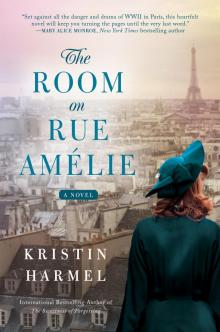 The Room on Rue Amélie
The Room on Rue Amélie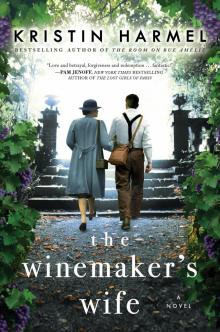 The Winemaker's Wife
The Winemaker's Wife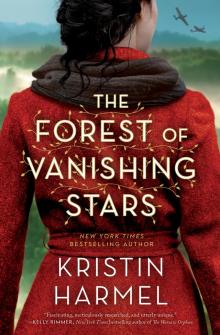 The Forest of Vanishing Stars
The Forest of Vanishing Stars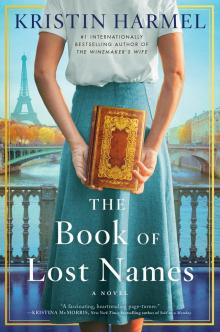 The Book of Lost Names
The Book of Lost Names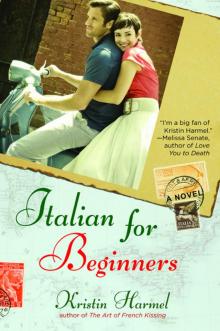 Italian for Beginners
Italian for Beginners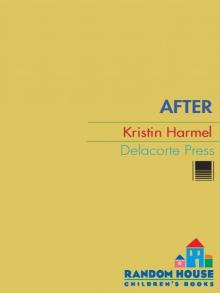 After
After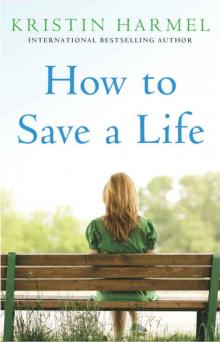 How to Save a Life
How to Save a Life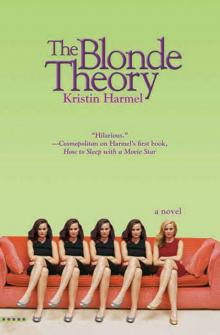 The Blonde Theory
The Blonde Theory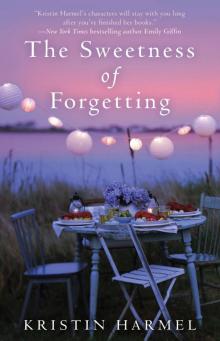 The Sweetness of Forgetting
The Sweetness of Forgetting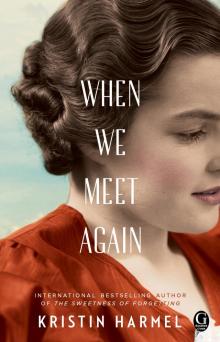 When We Meet Again
When We Meet Again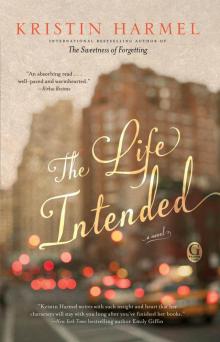 Life Intended (9781476754178)
Life Intended (9781476754178)